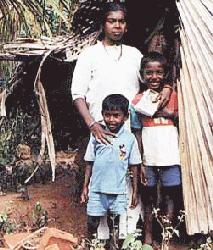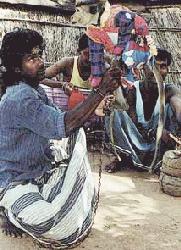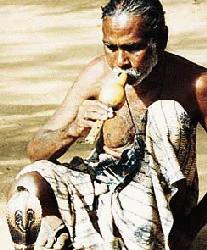 Year on the Web
Year on the Web Year on the Web
Year on the Web


They have, all these days led a nomdic existence. Today they are trying to integrate with the community and their problems are many. Hiranthi Fernando reports:
 A typical gypsy hut: ostracised from society
A typical gypsy hut: ostracised from society
For centuries their
an cestors led a nomadic existence as gypsies but at Kudagama, a Mahaweli
settlement in Tambuttegama a clan of Ahikunthka settlers are now trying to
integrate with the mainstream of society. About 200 families have built their
simple homes here in an attempt to establish roots in a fixed abode. A section
of the clan remain to look after their homesteads and cultivate the land, while
the rest continue their roving life to earn a living. The day we visited
Kudagama, it was bustling with activity. The members of the Ahikuntaka clan
occupying the settlement had returned from far and near for the monthly meeting
date set by their clan leader.
Situated by the Rajangane Tank, Kudagama is reached by a gravel track about two kilometers off the Tambuttegama-Anuradhapura road. A small canal runs beside the track. On either side is a profusion of tall grasses, banana trees, manioc and a few coconut palms. Houses of mud or cadjan are built off the gravel track which branches off at intervals. Some of the houses are covered in the large Talipot leaves characteristic of a gypsy encampment. Chickens, pigs, goats, monkeys and even some porcupines are seen in the compounds around the houses. Innumerable dogs greet strangers with incessant barking.
The Chief or Arachchi of the clan, A.R.M. Nadaraja is also the President of the death donation society which is very active in the village. He lives in a house near the village well where the women congregate for water. A large old tree with spreading branches serves as the venue for the meetings of the clan held in the village each month.Nadaraja explained that his clan of about 200 families were settled at Kudagama in the period '83-'85 when they were displaced from Kuda Kumbukwewa where they lived earlier. "The Mahaweli Authorities brought us here promising us a village", he said. "However, only 23 families have been allotted half an acre of high land and 2.5 acres of paddy land. Later on, ten others were given only half an acre of highland. The rest have nothing at all. They have built their houses four or five to a plot".
On behalf of the clan, Nadaraja has requested the Mahaweli authorities to grant an allocation of land to eighty more families. They have appealed for at least one acre of paddy land from the 200 acres available .
"We are even willing to go to Girandurukotte if we can have some land to cultivate",
Nadaraja said. According to him, the Mahaweli Director had requested the Divisional Secretary to set up a land Kachcheri to examine the applications and allot land. However, nothing has happened yet.Nadaraja stresses that the lack of irrigation facilities is also a great drawback. "All the families have to use this one well since the others are dry", he said pointing to the well where a number of women had gathered with their pots. "We have no wells, no tube wells, no electricity and no community services at all", Nadaraja complained. They have appealed to the Mahaweli authorities several times.
Nadaraja further explained that although 23 families are supposed to have irrigation facilities for their cultivation, water is available only for ten families. It appears that the settlers living further upstream siphon off most of the water for their fields and there is little flowing downstream. When the officials come to investigate their complaints, the unauthorised pipes are pulled out and water is released downstream. When the officers leave, the pipes is connected once again. So even the families with land have no water to cultivate properly.
Inability to obtain a bank loan to improve their property, build a house or engage in a self- employment project is another problem these settlers face. "Not a single member of our clan has been granted a housing loan. We have no security to offer", Nadaraja said.
 Monkey
dance: now they face a different tune
Monkey
dance: now they face a different tune
The settlers of Kudagama are
thus finding it increasingly difficult to earn a living. Unable to cultivate
properly, they raise chickens, pigs, goats and porcupines. They also catch
monkeys and snakes from the jungles. Some of the men seek casual labour nearby.
Others continue to roam the streets engaging in their traditional occupations
such as snake charming, monkey dancing and fortune telling. In groups of five to
ten families, they travel around the country and pitch their temporary
encampments on unoccupied lands with access to water. They go out to
Mahiyangana, Kurunegala, Kegalle, Mirigama and around Colombo to eke out a
living. Occasionally, they have a windfall when a foreign tourist comes to the
village to take photographs of their snakes and monkeys.
 Vengatan: holding on to the traditional occupation of snake charming
Vengatan: holding on to the traditional occupation of snake charming
Sixty-
five-year-old D. Vengatan, the father-in-law of Nadaraja, has been a snake
charmer since childhood, just as were his father and grandfather. Due to ill
health, he and his wife Engatakka are now resident at Kudagama where they have
half an acre of high land. On their plot of land they have built a mud walled
single roomed thatched house and a little kitchen beside it. Both house and
compound were kept neat and clean. A few fruit trees were grown in the garden.
A baby monkey frolicked on a tree. Vengatan continues with his age old
occupation of snake charming, travelling to places nearby.
"A wandering life is difficult. Travelling from place to place with our sick, our elders, young children and pregnant mothers in addition to our animals and other belongings is no easy task", says Engatakka. "We are no longer fit for a wandering life. Here at least, we have a place to call our home".
Vengatan brought out his cane baskets of snakes and a reed flute and demonstrated his prowess, squatting on his haunches outside his house. Several young men with performing monkeys also brought them along, eager to show off their skills. Almost every house in the village seemed to have a monkey tied outside on a tree.
Living next door is Anuwakka, the comely young wife of Vengatan's brother. The mother of three small children, Anuwakka goes out palm reading and fortune telling to earn some money. She was keen to read our palms.
Further down the track lives R. Anawathu who makes snake stones. These he takes for sale on his wanderings. His small daughter accompanies him carrying a cobra slung round her neck. He says the foreign tourists like to see the small girl with the cobra. For his snake stones, Anawathu uses five kinds of herbal medicines which he grinds together and mixes with five oils. After drying for two to three days, the mixture is baked in moulds over a fire. Anawathu makes a batch of 50-100 stones at a time. He says that when the stone is placed on a snake bite wound, it absorbs the blood and the venom along with it. He goes as far as Vavuniya with his snake stones.
Whereever they roam, each month, the members of the clan return to Kudagama on a date fixed by their leader. They gather together and discuss the affairs of the village as well as of the death donation society to which they all subscribe monthly. Shramadana work is done for the improvement of the village. Disputes among the clan are settled and offenders are fined or punished according to their crime. Before they leave the village, a date is set for the next month's gathering. If the clan members do not come on the due date, they are fined. "In the old days, the money collected from the fines was used to buy Arrack which we all shared", commented Vengatan. "Now it is mostly used for village development".
Despite their efforts to integrate, the Ahikuntaka clan still faces ostracism. Settlers in neighbouring villages view them with prejudice and suspicion. Nadaraja says the other villagers do not like the age old gypsy customs. As a result, they have adopted many of the local customs. Marriages too are registered with the marriage registrar.
The Kudagama clan is fortunate to have a primary school close by. The children of the village attend this school. A teacher at the school said that of the 216 children in the school, 156 are of the Ahikuntaka clan. The teacher said that at the school, they ensure that the children do not have any problems with the other children. The parents of the Kudagama children actively participate in the shramadana work of the school. The day we visited the village, most of the men folk were busy putting up tents for the school sports meet the next day. They had even postponed their monthly meeting giving precedence to school activities. According to the school teacher, the clan leader
Nadaraja maintains a good control over the members.Nadaraja said that a few children who wished to study further and attended the secondary school in Tambuttegama were ridiculed by the other children. As a result, these children had stopped going to school. "Although we would like our children to have a reasonable education and better themselves it is not easy to achieve. Many of them have to fall back on our traditional occupations", Nadaraja said.
Talking to the settlers of Kudagama, it appears that in their efforts to establish roots and integrate with the community, they face many obstacles. Having led roving lives with no fixed address for many generations, many of these gypsy families have no citizenship. They also have to overcome the prejudice and suspicion with which they are looked upon by their neighbours as well as many of the officials they have to deal with.
Yet, tenaciously, they persevere in the hope that one day, their children may succeed in shaking off the shackles that keep them down and be accepted into the mainstream of society.
Continue to Plus page 2 - Another Gandhi love story * Baptised Hindus * Asians race up list of Britain's richest






Please send your comments and suggestions on this web site to
info@suntimes.is.lk or to
webmaster@infolabs.is.lk